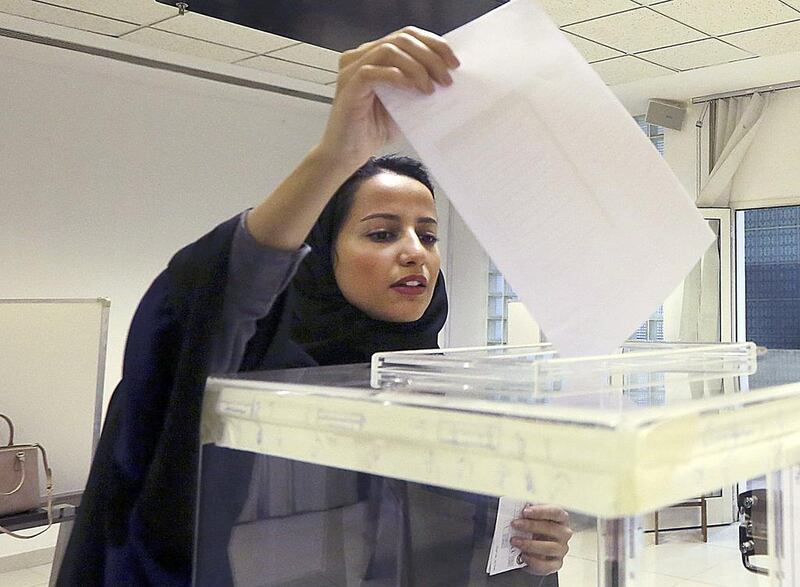RIYADH // At least 19 women won municipal council seats in Saudi Arabia’s first election open to female voters and candidates, officials said on Sunday.
“Even if it was only one woman, we’d be really proud of that,” said Sahar Nasief, a women’s activist in Jeddah. “Honestly, we weren’t expecting anyone to win.”
But with 2,106 seats up for election, the 19 women would comprise less than 1 per cent of elected council membership.
Those who won hail from vastly different parts of the country, ranging from Saudi Arabia’s largest city to a small village near Islam’s holiest sites.
General Election Commission spokesman Hamad Al Omar said 19 women won seats in 10 different regions, with results still to be announced in several more regions.
Not many women were expected to win seats, but even limited gains are seen as a step forward after their first participation in the electoral process.
Salma Al Oteibi in Mecca was the first woman announced to have won. Hanouf Al Hazmi won in the north-western region of Jawf, and neighbouring Tabuk elected two women.
To the kingdom’s east, Sanna Hamam and Maasooma Al Rida were elected in Ihsa province.
Municipal council duties are limited to local affairs including responsibility for streets, public gardens and garbage collection.
Saudi Arabia has some of the world’s tightest restrictions on women, including a ban on driving. It was the last country to allow only men to vote, and polling stations were segregated during the ballot.
More than 900 women were among the 6,440 candidates running for seats on 284 councils.
They could not meet face-to-face with male voters during campaigning, while neither men nor women could publish their pictures.
Women voters said registration was hindered by factors including bureaucratic obstacles and a lack of transport. As a result, they accounted for less than 10 per cent of registered voters.
Election commission data showed almost 1.5 million people aged 18 and above signed up for the polls, including about 119,000 women, out of almost 21 million Saudi citizens.
At least two parts of the country reported a female turnout of about 80 per cent, official data said.
In the mountainous Baha region, female turnout was about 82 per cent while about half the registered male voters cast ballots, data showed.
In neighbouring Asir, turnout was about 79 per cent for women and 52 for men.
Female candidates expressed pride in running, even if they didn’t think they would win, while women voters said they were happy at finally being able to do something they had only seen on television or in movies.
Nassima Al Sadah, an activist in the eastern city of Qatif, said the voting process itself took place relatively smoothly, unlike the registration.
Many female candidates used social media to campaign, but a handful of others, including women’s rights activists, were disqualified.
Women in Saudi Arabia still require permission from male family members to travel, work or marry.
A slow expansion of women’s rights began under King Salman’s predecessor Abdullah, who announced four years ago that women would take part in this year’s municipal elections.
Men have voted since 2005 in the local polls.
* Associated Press and Agence France-Presse





